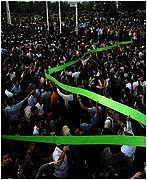Call For a National March on June 12
» Mousavi and Karoubi Not Wavering
As the anniversary of the disputed June 12, 2009 presidential election in Iran approaches, the two contesting candidates Mir-Hossein Mousavi and Mehdi Karoubi met to reaffirm their positions and the need for a national march 12 months after the events.
After their meeting, Mousavi and Karoubi, who have been calling since last year on the public to express their rejection of the announced election result that has kept incumbent president Mahmoud Ahmadinejad in office, announced that, “people should be invited to take part in a national march if an official permit is granted. Otherwise, announcements should be made through the peaceful and vast social networks.”
The former prime minister and the former Majlis speaker also called on for the clarification and publication of all the events that have taken place since last June, adding that “such a narrative is important for the advance of the green movement and it will shed light on the righteousness of the nation.”
The two leaders also cautioned on the futility of the government’s violence against the growing green movement and mentioned last week’s events at universities across Iran to be indicative of this adding, “People are calling for their rights provided in the constitution and want free and un-selected elections and the release of political prisoners and toleration of free media.”
Last week, Iran during the last several weeks has once again witnessed a new wave of attacks by Basij volunteers and the beating of students across Iranian universities, and particularly Tehran University, which have been picking up as the anniversary of last year’s rigged elections approaches. Courts too have been passing heavy prison sentences and disbarment from continuing education to student activists.
In their meeting Mousavi and Karoubi also reviewed the violence that has been committed by plain-clothes agents against opposition figure offices, personalities, etc and declared, “These events are planned in advance and follow the atrocities that were committed in Kahrizak prison and Tehran University dormitory, the only difference being they are now returning in a different form.”
Following their meeting, the two opposition leaders said that such atrocities were committed against people because people had remained silent over them. They stressed on the necessity of preventing and ending such illegal and anti-religious practices regardless of the ideology or accusations against whom they are committed, and that their rights had to be defended because Islam calls for the defense of the rights of the underdog, regardless of their views.
The calls by Mousavi and Karoubi are both a reference to and come after attacks on opposition figures. A few weeks ago former minister of communications seyed Ahmad Motamedi was attacked by a person and was injured. Following that attack, armed men carrying mobile radio communications gear attacked the car carrying Mohammad Ali Abtahi, a close associate of Karoubi, causing damage to it.
The two popular opposition figures also spoke against growing misinformation and data manipulation by officials and said the practices were un-Islamic, asking the public to call for separating Islam from such practices.
Another topic mentioned by the two was the economy and they listed the following as the main current economic problems: a regression in national industries, growing unemployment, and the dire conditions of salaried individuals, workers and teachers.
They pointed out that the authorities were distracting public attention from the country’s serious issues, stating, “Instead of rationalizing unemployment and inflation, decision makers should be tackling these issues and support the national economy and they will see that there will be a drop in the rate of crime.”
And going back to their earlier positions, the two called on those responsible for the management of the national radio and television network (IRIB) to open up the network so that others could use it as well. “There will be more national unity if the network ended its monopolistic practices,” they said. National unity has been a call that leading administration officials have been making as a way to end the massive protests against last year’s presidential election. “To spread misinformation about the events of the first decade of the revolution, the voices of the rulers and foreigners unfortunately work in unison. It is necessary to present an unbiased picture of past events,” they declared.
Mousavi was Iran’s prime minister in the first decade of the 1979 revolution.
Mousavi and Karoubi’s calls for a national protest march on the anniversary of last year’s presidential election and at the same time their requests for a permit for such a gathering, and their emphasis on other upcoming anniversaries take place at a time when military authorities in the country, belonging to the Basij and the Revolutionary Guards (IRGC), have in recent weeks been warning against any protest gatherings.
Hossein Firuzabadi, Iran’s top military official spoke on the subject at last week’s congregational Friday prayers and said, “Even though the trouble makers have moderated their positions they are only playing politics and it is possible that those who are after a velvet coup will take the leadership again.”
IRGC deputy commander Ali Fazli also issued a warning over the upcoming anniversary of ayatollah Khomeini’s death and said, “We must blind the eyes of the troublemakers in this year’s celebrations.” He called on for 2 million people to participate in the prayers and added, “This year’s anniversary should turn out to be the largest.”
Hossein Hamedani, the IRGC commander of the Mohammad Rasoolallah force also implicitly called on the public to massively participate in the June 4 annual celebrations marking the death of ayatollah Khomeini and said the celebrations should be “unprecedented in earth.” He also called on those who would come to pray for the founder of the Islamic state to leave Khomeini’s mausoleum outside Tehran as pre-planned without creating any traffic. These words are seen as warnings to possible protests during the event.


